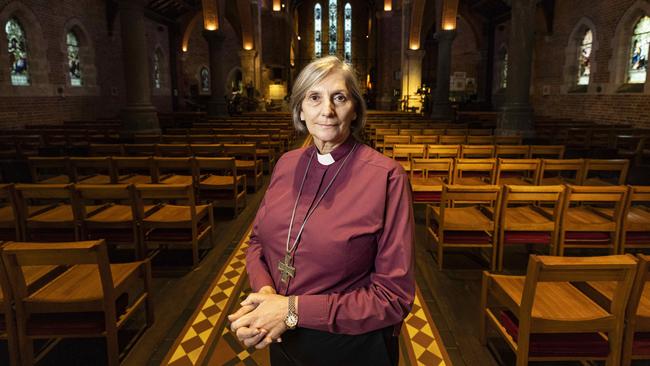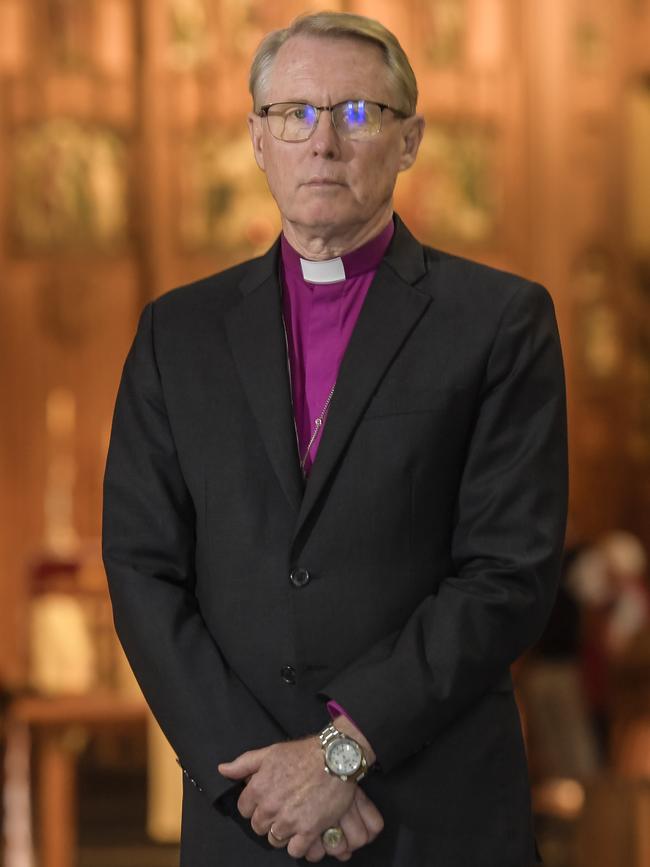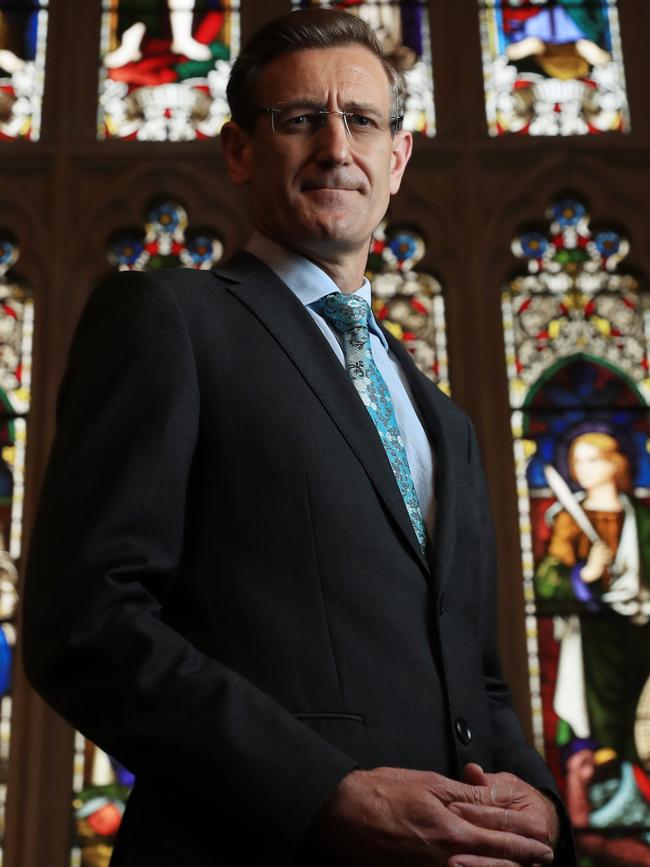It’s high noon for Anglicans as a showdown looms over same-sex marriage
The day of reckoning is at hand for Australia’s second-largest church and this much can be said with confidence: the proudly inclusive spirit of Anglicanism may not survive what happens next week.

The scene is the lush, green links of the Royal Pines Resort on Queensland’s Gold Coast, the occasion the church’s normally triennial General Synod that was put off in 2020 and again last year by the pandemic. Anglicans see it as their version of federal parliament.
And never has the parallel been more apt. In a sour reflection of the national political mood, the church is a house divided, beset by tribalism and bitter internecine squabbles over holy doctrine and earthly control. Some of the alleged antics would make even the most cutthroat Labor or Liberal apparatchik blush.
The catalyst was the 2017 plebiscite that brought same-sex marriage into the fold of secular law, but the fuse was lit decades ago as conservative and progressive Anglicans set to it, splitting into opposing camps. Sound familiar?
Yet if the resounding Yes vote for marriage equality allowed most Australians to move on from that epic clash in the culture wars, the breach inside the church has only deepened. Delaying the denouement at synod made matters worse, not better.
In what has been likened to a train wreck, positions on both sides have hardened to the point where there may be no turning back. “There could be a quasi-split where people just stop referring to the national church in any meaningful way,” warns leading progressive Peter Catt, dean of St John’s Cathedral in Brisbane.
Michael Stead, the conservative Bishop of South Sydney, tells Inquirer: “Our hope would be that we can stay together as a national church with everybody moving in the same direction. If there are parts of the church that choose to go in a different direction, we can’t stop them. But that would be their choice.”
Just about every aspect of the debate is fiercely contested, down to whether its starting proposition, that marriage is the union of a man and woman, is a question of “Big D” theological doctrine or second-order pastoral concern. Progressives accuse the conservatives of manipulating the numbers and financial clout of the powerful Sydney Diocese – seat of a surging evangelical movement – to take over General Synod and impose their will on the rest of the church, an allegation Stead rejects.
The conservatives, for their part, say the fight was not of their making and came to a head when the Wangaratta Diocese in Victoria provocatively broke ranks to bless a same-sex marriage. The Appellate Tribunal – the church’s highest dispute resolution body – in November 2020 ruled by majority decision this was allowable under canon law. Essentially, the panel took a narrow view of what “doctrine” meant in the church constitution, holding it pertained to core matters of faith necessary to salvation rather than the day to day of religious practice.
“The contending views about ‘blessing’ same-sex marriages are strongly held,” the 5-1 decision found. “But, with respect to some of the recent rhetoric, and the actions taken abroad by some bishops of this church, the blessing of same-sex marriages does not involve denial of God or repudiation of the Creeds or rejection of the authority of Holy Scripture or apostasy on the part of bishops or synods prepared to support such measures.”
The ruling also opened the way for conservatives to make their case to the General Synod to affirm the established position that marriage was exclusively between a man and woman. The vehicle was in the untested form of a “statement”, a non-binding resolution due to be moved by the Archbishop of Sydney, Kanishka Raffel, on Tuesday, day two of the conference.
If the wording comes across as arcane – “the solemnisation of a marriage between a same-sex couple is contrary to the teachings of Christ and the faith, ritual, ceremonial and/or discipline of this church”, the statement reads – the line in the sand drawn by the conservatives is all too evident.
“It is about remaining true to the teaching of Christ,” says Stead.
“As a bishop of the church I have given an undertaking to maintain and uphold the teaching of Christ … and it seems very clear that what Jesus says about marriage, particularly in Matthew 19, is that marriage is between a man and a woman. To bracket off some of the teachings of Christ and say they’re not sufficiently important to count as doctrine seems like a very strange way to pass on the teachings of Christ, to say there are some teachings you can ignore because they don’t go to a person’s salvation.”
Catt replies: “Our church has tended to define doctrine in a very narrow band of subjects … things like the nature of God, the nature of Jesus and maybe the nature of the church and sacraments. Marriage hasn’t been seen as one of the ‘Big D’ doctrinal issues … I would see our understanding of marriage as being more relational, pastoral, than doctrine even though there has been an increased use of that term associated with marriage over the past decade.”
Before we get lost in theological semantics, Anglican Primate and Archbishop of Adelaide Geoff Smith cuts through with this assessment: “The scriptures and understanding of the church is that … marriage is between a man and a woman and that is not at issue. I am not aware of any proposal to alter that,” he says.
“The current discussion is really about the ‘therefore’ part. Is it the case that therefore blessing a marriage that is not between a man and a woman is inappropriate or impossible or not to be done?
“Or is it the case that, yes, the doctrine of the church is that marriage is between a man and a woman, but actually we are living in a culture and society where lawful marriage is possible between a man and a man or a woman and a woman, and there might be good that comes from that relationship and it might reflect something of God’s love, and therefore it’s appropriate for some kind of blessing or recognition.”
As Smith points out, the Australian church has been here before and come through intact. Witness the pitched battles over the ordination of female priests in the 1990s, female bishops in the noughties and the relaxation of strictures on divorced people remarrying, all vehemently and unsuccessfully opposed by conservatives from or aligned with the Sydney evangelicals.
From time to time there has been speculation that the church’s largest and wealthiest division would storm out – something that has happened in New Zealand and the US over same-sex marriage.


Muriel Porter, a 30-year veteran of General Synod and well-followed chronicler of church affairs, says a newly minted legal entity called the Diocese of the Southern Cross would be the vehicle for Sydney and its hangers-on to go their own way should their push at General Synod fail. This has been set up by the Global Anglican Futures Conference, Gafcon, an umbrella for the arch conservatives. She is convinced, though, that leaving is no longer part of the conservative agenda. Far from it.
“They’re not going anywhere,” Porter says. “When they lost out on the ordination of women in 1992, they vowed, never again. Instead of leaving the church, they have taken it over in a very calculated and systematic manner. They now dominate the General Synod to such an extent that it is no longer representative of the rest of the church in Australia.”
The numbers tell the story, she insists. The Sydney Diocese commands 73 of the 249 votes at General Synod, compared with only 47 for similar-sized Melbourne and 20 for Brisbane. How? Porter claims the Sydneysiders have ruthlessly stacked the numbers on the national conference which, like parliament, makes canon or ecclesiastical law as well as church policy.
It works like this: under a quota system, each of the 23 Anglican dioceses is awarded two seats – one for a cleric, the other for a lay person – for every 20 ordained ministers in full-time paid service. These sit in the House of Clergy and House of Laity respectively within General Synod. A third grouping, the 24-strong House of Bishops, contains the metropolitan archbishops and diocesan bishops plus the National Aboriginal Bishop, Chris McLeod. As titular head of the church, the primate presides as president of the assembly.
But Porter complains that Sydney fixed the numbers by making entry-ranked deacons of staff who would not typically be ordained.
“We’re talking youth workers, that sort of thing, and lots of them,” she says.
Catt calls it a process of “colonisation”, backed by the financial muscle of Sydney. When the big city division bailed out the struggling Bathurst Diocese, the cash came with strings attached: Sydney would get a right of veto over the appointment of the next bishop there. “There’s a sense of disappointment and increasing anger that we’ve been holding to this expansive vision of what the church is, and how the different traditions contribute to the richness of the tapestry, when that’s been sort of used and abused and you end up with an act of colonialism,” Catt says.
Rejecting the criticism, Stead says Sydney’s representation at General Synod is a measure of the success of evangelical ministries, the only section of the church growing. The diocese’s voting bloc is “in direct proportion to the 270 parishes we have, the people we have in churches and the ministers appointed to those churches”, he maintains.
As for Porter’s allegation of number stacking: “We appoint deacons because they have jobs to do and they get paid to do them,” Stead says. “The Sydney Diocese doesn’t have the money to pay people to do ministry that doesn’t exist.”
Predicting an outcome of the synod showdown is fraught, despite the cards the conservatives hold going into the votes on same-sex marriage blessings and a related statement, put up by Stead, enforcing chastity rules for priests.
The expectation is that the call will be by order of houses, meaning the motions must successively pass the laity and clergy before coming before the bishops, where the numbers are believed to be tightest.
Either way, the ramifications for the national church are potentially dire. While no one is foreshadowing an outright rupture – Archbishop of Perth Kay Goldsworthy says her progressive diocese will stay, come what may – the possibility cannot be discounted.
Prominent Sydney conservative David Ould, the senior associate minister at St John’s Cathedral, Parramatta, who writes an influential blog, cautions: “If General Synod cannot uphold basic biblical morality my suspicion is that a number of dioceses will say they can no longer be part of it. I wouldn’t be surprised if that is said during the debate.”
Catt says progressive jurisdictions such as Brisbane could simply ignore any statement by synod, as Sydney does in refusing to ordain women beyond the base level of deacon. This would foment the “quasi split” he flags and further destabilise the Anglican compact.
“They would just get on with their own business and the national church would keep doing its thing,” he says.
“Because of its federated nature, you can largely do that anyway. When the church nationally decided to support the ordination of women, that had no bearing on the life of the diocese that decided it didn’t want it … the difference between the national church and the dioceses could just keep getting broader and broader.”
Smith accepts it is entirely possible that the relationship between the constituent parts of Australian Anglicanism will be “further diminished”, a prospect he regrets.
Take the position of Goldsworthy, a supremely accomplished woman and fine servant of the church by any yardstick. She was among the first women to be ordained, the first to be consecrated as bishop and is on the record as having voted for same-sex marriage in the 2017 plebiscite. Yet she can’t officiate in Sydney unless she dresses down as a humble deacon, an indignity no man would have to accept.
A generally forthright Stead hesitates when asked to justify this. “Do I feel uncomfortable?” the bishop muses, weighing the question. “There are many things about the Christian faith that I recognise are completely countercultural to the world in which we live.
“Every time I try to explain to young people that to follow Jesus you shouldn’t sleep around before you get married, you should remain faithful to your marriage partner for the rest of your life, I can see the look on their faces that they think I am absolutely ridiculous, out of my tree.
“So I understand that the world around me makes no distinction in relation to the role that a man and woman can have in any part of life, and in the rest of our church that’s particularly the case. We have very competent women who chair boards or head corporations, who lead our schools.
“But on this particular issue the Bible says that a woman shouldn’t be a leader of a congregation and we want to do what the Bible teaches even if the world around us thinks we are crazy.”




The day of reckoning is at hand for Australia’s second-largest church and this much can be said with confidence: the proudly inclusive spirit of Anglicanism may not survive what happens next week at a twice-postponed showdown of bishops, priests and elders.